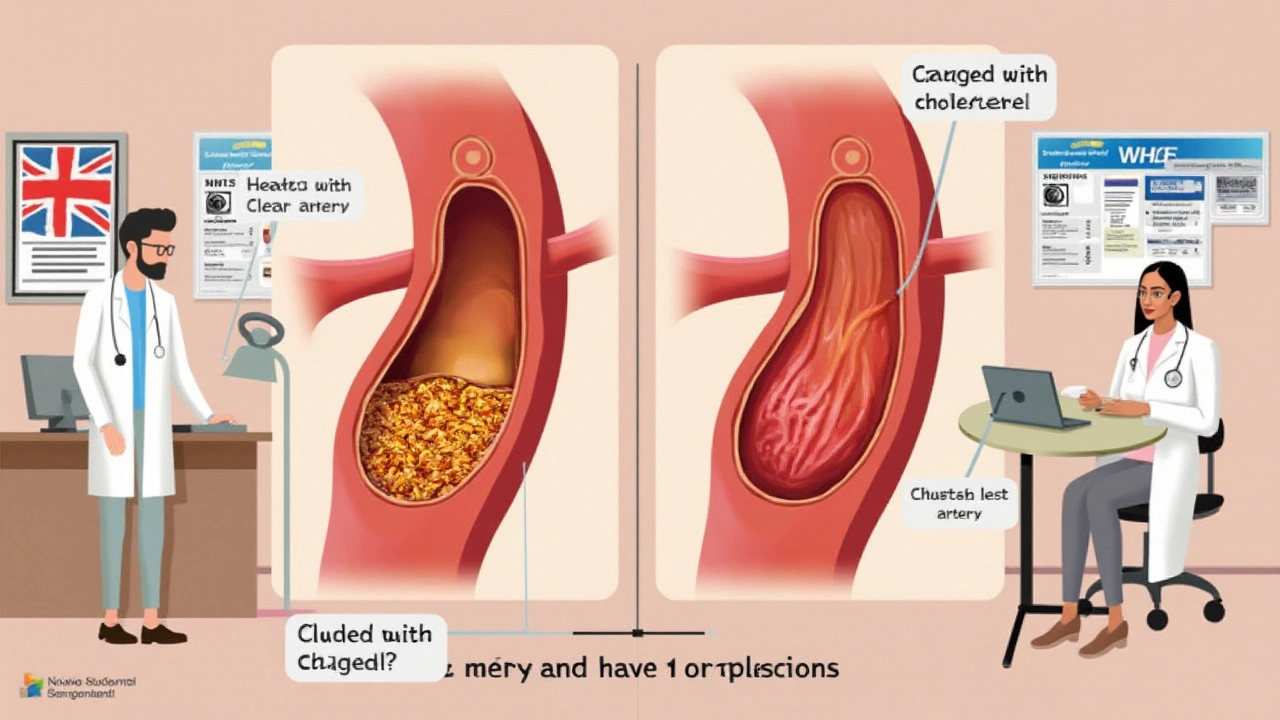Understanding Trans Fats and Their Connection to Hypercholesterolemia
 Sep, 4 2024
Sep, 4 2024
Trans fats are a type of fat found in many processed foods. They can negatively affect your cholesterol levels and increase your risk of heart disease. Knowing more about trans fats and hypercholesterolemia can help you make healthier choices.
Our bodies need some fats to function, but trans fats are not one of them. These fats can raise bad cholesterol levels and lower good cholesterol, leading to heart problems.
It's important to be aware of where these fats come from and how to reduce them in your diet.
- What Are Trans Fats?
- How Do Trans Fats Affect Cholesterol?
- Sources of Trans Fats
- Tips to Reduce Trans Fat Consumption
What Are Trans Fats?
Trans fats, also known as trans-fatty acids, are a form of unsaturated fat. Unlike other fats, these are artificially produced and rarely found in nature. They're created through an industrial process known as hydrogenation. This process adds hydrogen to liquid vegetable oils, making them more solid. The whole reason for turning liquid oils into solid fats was to enhance the taste, texture, shelf life, and stability of foods. One of the earliest and most popular products to use trans fats was margarine.
This method of creating trans fats was considered a breakthrough in the food industry back in the day. However, we now understand that the health implications of consuming these fats are severe. The reason lies in how our bodies process them. Our enzymes don’t handle them well compared to naturally occurring fats. This difficulty in processing can lead to an increase in bad cholesterol (LDL) and a decrease in good cholesterol (HDL). As a result, trans fats are often linked to hypercholesterolemia and heart disease.
In fact, heart disease is the number one cause of death globally. This was highlighted by the World Health Organization (WHO), which stated, "There is no safe level of consumption of trans fats, and people deprived of healthier food choices should not suffer the consequences of such consumption."
The American Heart Association explains, "Clinical trials have repeatedly shown trans fats significantly increase the risk of coronary heart disease," reinforcing the critical need to limit their intake.
Not all fats are created equal. While some fats, like omega-3 and omega-6 fatty acids, are beneficial, trans fats offer no health benefits. They only offer risks. Historically, trans fats were used in many processed foods, including baked goods, snacks, fried fast foods, and some refrigerated dough products. Although regulations have restricted their usage, they still lurk in some foods.
Even though many food manufacturers are now moving away from using trans fats, it’s crucial to read labels when you buy groceries. Terms like "partially hydrogenated oils" hiding within ingredients list should raise a red flag. By knowing what to look for, you can help protect your heart and reduce your risk of hypercholesterolemia and other related health issues.

How Do Trans Fats Affect Cholesterol?
Trans fats, also known as trans-fatty acids, are particularly harmful when it comes to their effect on your cholesterol levels. When you consume trans fats, they can raise your level of LDL cholesterol, which is commonly known as the bad cholesterol. High levels of LDL cholesterol can lead to a buildup of plaque in your arteries, causing them to become narrow and hard. This condition, called atherosclerosis, increases the risk of heart diseases such as heart attack and stroke.
What makes trans fats especially bad is that they don't just raise your LDL cholesterol; they also lower your levels of HDL cholesterol. HDL cholesterol is the good kind that helps remove other forms of cholesterol from your bloodstream. By reducing HDL, trans fats lower your body's ability to fight off cholesterol buildup, making it a double threat to your heart health.
According to the American Heart Association, even a small intake of trans fats can have harmful effects. They recommend limiting trans fat intake to less than 1% of your total daily calories to minimize these risks. Since 2006, the U.S. Food and Drug Administration has required food manufacturers to list trans fat content on nutrition labels, making it easier for consumers to avoid them.
"The consumption of industrial trans fats is estimated to cause around 500,000 premature deaths from coronary heart disease each year worldwide." - World Health Organization
The impact is not limited to heart disease. Recent research suggests that trans fats may also increase the risk of developing type 2 diabetes. They can cause inflammation and insulin resistance, both of which are risk factors for diabetes. These fats may also play a role in brain health, potentially affecting memory and cognitive functions over time.
Many processed foods, including baked goods, snacks, and fried foods, are major sources of trans fats. Often listed as partially hydrogenated oils in ingredient lists, these fats are created through an industrial process that adds hydrogen to liquid vegetable oils to make them more solid. This feature extends the shelf life of foods but at the expense of your health.
In recent years, many countries have taken steps to ban or limit the use of trans fats in foods. Denmark was the first country to do so in 2003, followed by other countries and regions. Despite these measures, trans fats can still be found in some food products, making awareness and careful label reading essential for anyone looking to protect their heart health.
Cholesterol levels are critical indicators of heart health, and the role of trans fats in raising bad cholesterol while lowering the good type makes them a significant public health concern. By understanding how trans fats affect cholesterol, you can make better dietary choices and contribute to your overall well-being.

Sources of Trans Fats
Trans fats, often dubbed as the 'dangerous fats', are found in various everyday foods. Their presence in our diets has been a growing concern due to their adverse effects on cholesterol levels. Understanding where these fats come from can help you make better dietary choices.
One primary source of trans fats is partially hydrogenated oils. These oils are used extensively in processed foods to improve texture, shelf life, and flavor stability. You'll often find them in baked goods like cookies, cakes, and pies. The crispy, flaky textures enjoyed in pastries and crackers are frequently results of trans fats.
Fast food chains also rely heavily on trans fats. Foods like French fries, fried chicken, and doughnuts are not only high in calories but are also significant contributors to one's trans fat intake. The fast food industry favors these fats because they can be reused multiple times before spoiling, making them cost-effective.
Another notable source is margarine and shortening. Though many brands now offer trans-fat-free versions, traditional forms still contain these harmful fats. Margarine is often used as a spread and in cooking and baking, sometimes unbeknownst to the person consuming it.
Dr. Walter Willett of the Harvard School of Public Health has stated, "Elimination of trans fats from the food supply could prevent tens of thousands of heart attacks and cardiac deaths each year." This quote underscores the importance of cutting these fats from our diets to enhance heart health.
Packaged snacks like chips and microwaveable popcorn also contain trans fats. Thanks to stricter regulations, many manufacturers have reduced the trans fats in these products. However, some still feature them due to their ability to enhance taste and preserve shelf life. Always checking the ingredient list for the term 'partially hydrogenated oils' is essential.
Moreover, many restaurant dishes carry hidden trans fats. Foods might seem healthy at first glance but can be cooked with trans-fat-laden shortening or oil. Thus, even when dining out, it's crucial to inquire about how your food is prepared. Even homemade foods aren't entirely safe if you're not careful about the ingredients you use.
The food industry has made efforts to reduce trans fats in products following increased awareness and regulations. Still, they haven't disappeared completely. Reading nutrition labels carefully and opting for natural, unprocessed foods are practical steps you can take to protect your heart health.

Tips to Reduce Trans Fat Consumption
Cutting back on trans fats can seem challenging, but with a little effort, it's entirely doable. Understanding where trans fats hide in our diets is the first step towards making healthier choices. Many processed foods, particularly those that are fried, baked, or made with shortening, are loaded with these unhealthy fats.
To start, always check the nutrition labels. Foods labeled as containing partially hydrogenated oils have trans fats. Sometimes, products marketed as “zero trans fats” may still contain up to 0.5 grams per serving. Over time, even small amounts can add up.
Another great way to reduce trans fat intake is to cook more at home. When you're in control of the ingredients, it's easier to avoid unhealthy fats. Opt for healthier cooking methods like grilling, steaming, or baking instead of frying. Use oils that are low in trans fats, such as olive or canola oil.
Eating more whole foods and fewer processed items is key. Whole foods like fruits, vegetables, whole grains, lean meats, and fish are usually free from trans fats. Processed snacks, frozen meals, and fast foods are often culprits of hidden trans fats.
“Reading labels and being aware of what you eat can significantly reduce your trans fat intake,” says Dr. Jane Smith, a renowned nutritionist.
When dining out, don't hesitate to ask how your food is prepared. Many restaurants use trans fat-heavy oils for frying. Opt for grilled or steamed dishes instead. Some restaurants have started to eliminate trans fats, but it’s always good to double-check.
Finally, replace bad fats with better ones. Foods like avocados, nuts, seeds, and fatty fish contain healthy fats that are good for your heart. These fats can help lower bad cholesterol (LDL) and raise good cholesterol (HDL).
To sum up, reducing trans fats is all about making informed choices. Read labels, cook at home, and choose whole foods. With these simple changes, you can improve your heart health and lower your risk of hypercholesterolemia.


Jackie R
September 11, 2024 AT 00:54Trans fats are a scam pushed by Big Food to keep you sick and dependent on their junk. Read the label or die poor.
Caden Little
September 12, 2024 AT 21:51Love this breakdown! Seriously, if you're eating anything with 'partially hydrogenated' in the ingredients, just put it back. Swap it for avocado toast or a handful of almonds - your heart will thank you. 🙌
Alexander Ståhlberg
September 14, 2024 AT 14:22Let me tell you something - I used to eat microwave popcorn like it was my job. Every Friday night, a whole bag, buttery, salty, crunchy - pure joy. Then I read the label. Partially hydrogenated oils. That’s not food, that’s chemical warfare disguised as comfort. I had a panic attack in the grocery aisle. My cholesterol jumped 40 points in six months. I didn’t just cut trans fats - I declared war on processed food. Now I cook everything from scratch. Kale smoothies at 6 AM. Grilled salmon with lemon. My wife says I’m obsessed. I say I’m alive. And if you’re still eating that crap, you’re not just unhealthy - you’re complicit.
Michael Schaller
September 15, 2024 AT 02:41My grandma made pie from scratch. No hydrogenated shortening. Just butter, flour, sugar, and love. She lived to 92. Coincidence? I don’t think so.
Manish Mehta
September 16, 2024 AT 12:06Why do we even need trans fats? Just use coconut oil or olive oil. Simple. Why make it complicated?
Robert Andersen
September 18, 2024 AT 01:04It’s funny how we’ve gone from ‘fat is bad’ to ‘trans fat is evil’ to ‘maybe all fats aren’t the enemy’ - and yet we still treat food like a moral test. Is your cholesterol high because you ate margarine, or because you’re stressed, sleep-deprived, and eating out of boredom? We’ve turned nutrition into a religion, and the trans fat demon is our new original sin. But the truth? It’s not the fat. It’s the system. The food industry didn’t invent trans fats to kill us - they invented them because they were cheap, stable, and profitable. And we bought it. Literally.
Tom Caruana
September 19, 2024 AT 23:31They’re hiding trans fats in ‘organic’ stuff now 😭 I found it in my ‘healthy’ granola bar. The FDA is in on it. They’re all bought off. #TransFatCoverUp #BigPharmaLies 🤫💊
Jim Aondongu
September 20, 2024 AT 05:13Patrick Klepek
September 20, 2024 AT 11:52So let me get this straight - we banned trans fats in Denmark in 2003, yet here in the US we’re still debating whether ‘0g trans fat’ on a label means ‘actually zero’? We’re basically running a national experiment on our own citizens. And the control group? The people who can afford to buy organic, read labels, and cook from scratch. The rest of us? We’re the lab rats. And the lab is called Walmart.
Sarah Cline
September 21, 2024 AT 01:24Yessss! I started reading labels after my dad had a heart attack. Now I always check for ‘partially hydrogenated’ - and if it’s there? Back on the shelf. It’s not about being perfect - it’s about being aware. You got this 💪❤️
Muzzafar Magray
September 22, 2024 AT 23:26Trans fats are just the tip of the iceberg. They want you addicted to processed food so you keep buying it. Sugar, salt, MSG - it’s all engineered. Your brain doesn’t know what to do with it. You’re not weak - you’re being manipulated. And the worst part? They call it ‘convenience’.
Renee Williamson
September 24, 2024 AT 22:02My cousin died at 38 from a heart attack. He ate nothing but fried chicken and Pop-Tarts. The coroner said ‘severe atherosclerosis due to industrial trans fats.’ Now I cry every time I see a Krispy Kreme. They knew. They KNEW. And they sold it to kids. 😭
Okechukwu Uchechukwu
September 25, 2024 AT 11:57Interesting how we demonize trans fats while ignoring that the entire food system is designed to make you sick. Why are we surprised? The same corporations that sold us trans fats now sell us ‘low-fat’ sugar bombs. It’s not about the fat - it’s about profit. We’re all just consumers in a death cult dressed as a grocery store.
Eric Donald
September 25, 2024 AT 19:07It’s worth noting that while regulations have reduced industrial trans fats significantly, natural trans fats - like those in dairy and meat from ruminants - are present in small amounts and appear to have neutral or even beneficial effects. The real issue is the industrial variety. Label reading remains critical, but context matters. Not all fats are created equal, and not all trans fats are created equal. The science is nuanced, and reducing fear to a single villain oversimplifies a complex issue.
Sierra Thompson
September 26, 2024 AT 11:44If trans fats are so dangerous, why are we still allowed to buy them? Why aren’t they banned everywhere? It’s not about health - it’s about who can afford to eat clean. The real epidemic isn’t cholesterol. It’s inequality.
Sebastian Brice
September 27, 2024 AT 13:50My mom used to say, ‘If it comes in a bag with a list of ingredients longer than your arm, it’s not food - it’s science.’ She was right. I used to think she was just being old-school. Now I get it. We didn’t need to invent hydrogenated oils to make food tasty. We just needed to stop being lazy.
Josh Arce
September 28, 2024 AT 02:37Trans fats? Bro, that’s just saturated fat with extra steps. They’re just trying to scare you so you buy their ‘clean label’ $8 bread. It’s all marketing. Eat butter. It’s natural. They hate butter because it’s not profitable.
Caden Little
September 28, 2024 AT 03:39So true! And if you’re cooking at home, you’re already ahead of 90% of the population. Keep going - you’re not just eating better, you’re reclaiming your health. 🍳❤️